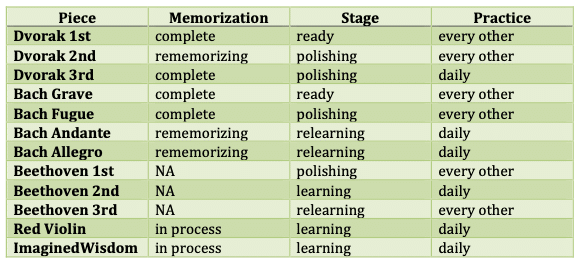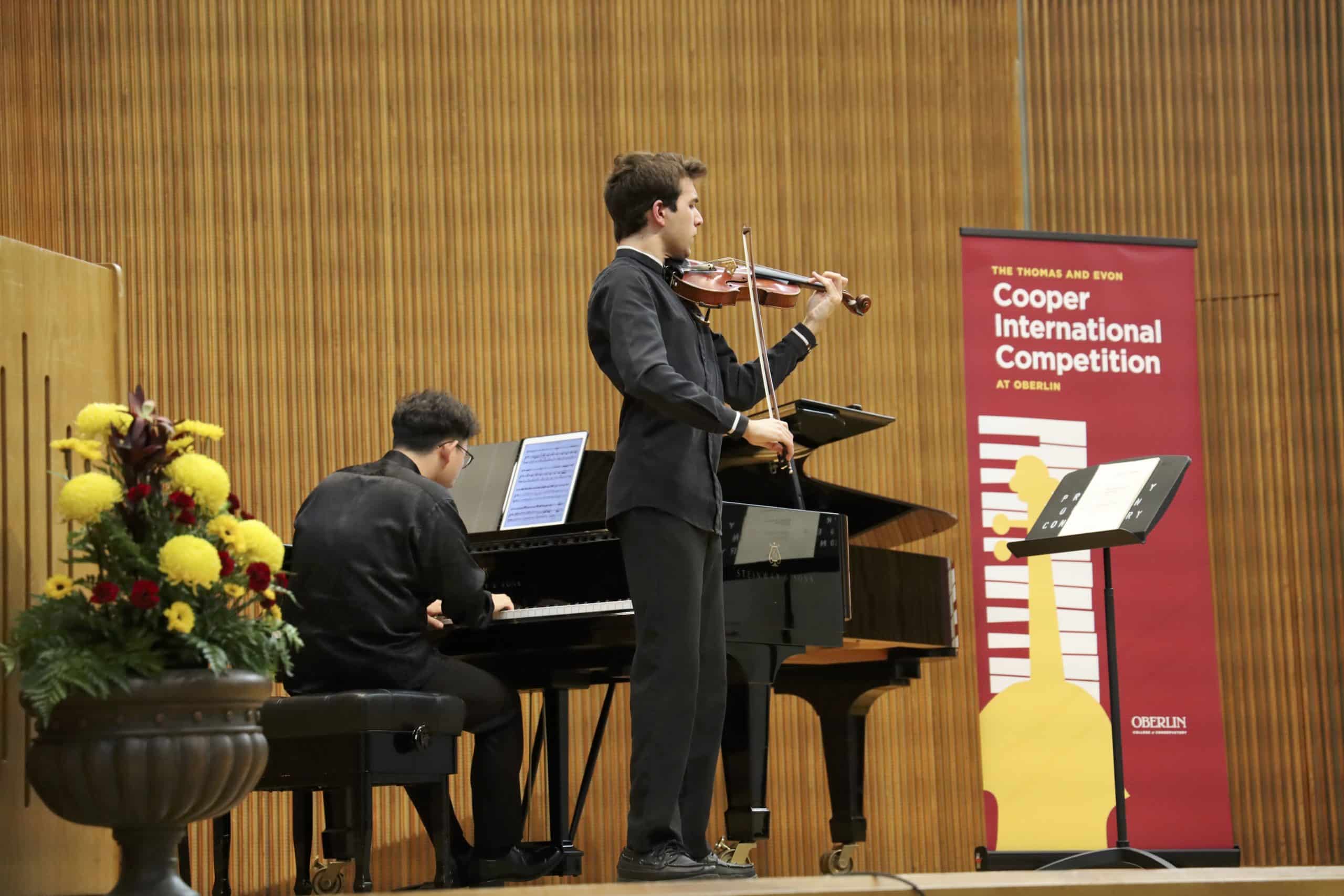My name is Sameer Agrawal and I am a 17-year-old violinist from Albany Park in Chicago. I am a senior at Northside College Prep and I study at the Music Institute of Chicago Academy. I’ve been in CMPI for four years, since the inaugural cohort in 2019.
In the past year, I’ve had to prepare large amounts of repertoire for various occasions. I had never really prepared lots of repertoire at once before this year, so it was a new experience for me. The first occasion was the Johansen International Competition, which required me to prepare a concerto, sonata, and an unaccompanied Bach sonata or partita in full, as well as a showpiece and commissioned work. The second was the Cooper International Competition, which required a different concerto, two showpieces, and six other movements or short pieces. Finally, I am now preparing for college auditions, which require me to bring two full concertos, a complete Bach unaccompanied sonata, a Paganini caprice, and a few other works.
Choosing Repertoire
The most important thing to do when balancing large amounts of repertoire is planning, especially planning well in advance. You cannot leave anything to the last minute since you need time to practice, memorize, and feel comfortable playing every piece. In terms of what repertoire to play, it is often best if some or all of the pieces you are playing are not new. When given a choice, picking pieces that you have already learned or performed will not only make the learning process faster, but it will also help you play your pieces at a higher level. For example, this year I brought back five works I had played previously. Below is an example of a spreadsheet I made to plan for the Johansen Competition.

Making a Schedule
Most of the time, when balancing large amounts of repertoire, you will be practicing some pieces on one day and other pieces on another day. For example, if you are preparing for college auditions, different auditions with different repertoire will be spread out over a few weeks or months. As a result, it is very important to organize your schedule and make sure you know exactly what pieces you need and when. A good way to do this is to make a spreadsheet with all of this information. Another strategy is to create a schedule that provides approximate dates when you want certain pieces to be learned, up to tempo, memorized, or polished.
In terms of planning your practice, creating weekly practice schedules is a very good strategy. It is really easy to forget a piece or not focus enough attention on some of your repertoire when you are concentrating more on other pieces. For my first competition that required preparing a whole program of repertoire, each week I would make a schedule of the pieces or movements I would practice each day. This was really helpful for me because I could prioritize what pieces I needed to practice the most. For example, I had to learn a new commissioned piece for the competition, so for a while I put that on almost every day of the schedule. Most other pieces or movements I scheduled around three days per every week, or more if I felt a piece needed extra practice. When having lots of repertoire, it is unrealistic to practice every piece every day, especially when balancing it with school and other parts of life. In addition, the first few weeks will be more practicing, but as you get closer to the performances or auditions, you will spend more time running through pieces every day. Below is an example of a weekly practice schedule from one of my competitions.

Performance Opportunities
When it comes to actually preparing and polishing the pieces as best as you can, there are a few strategies I have found to be really helpful. The most important is performance opportunities. Play as many of your pieces as possible on CMPI recitals, studio classes, or other opportunities you have. I like to play some of my pieces for the residents at retirement homes, and this year I did four full recitals for these communities to help me prepare. Sometimes I also play for friends, either in person or online. Performing is important because it helps simulate the feeling of the actual audition or competition, and there are always things you can learn from performing that you just cannot learn from practicing. In addition, playing for different teachers or in masterclasses is always helpful, because teachers can give you new ideas and strategies for your playing and interpretation.
Another really helpful strategy for me is to rehearse with an accompanist regularly, especially if your audition or performance will be accompanied. This is because playing with piano is sort of like halfway between practicing and performing, and it helps you practice performing, as well as learn your piece better.
Managing Stress and Anxiety
Preparing for major events like auditions and competitions can induce a lot of anxiety and stress. It is always important to keep everything balanced and keep yourself healthy. Before my first competition, I worked with musician coach Renée-Paule Gauthier to help me feel more confident and comfortable when performing. I also made sure to eat well and rest as much as I could.
Lots of repertoire comes with lots of practicing, and it is important not to overpractice because it can lead to injury. A few months before my second competition, I started having some arm pain, but I started working with a physical therapist to help me heal quickly. He also helped me learn how to practice while keeping my body healthy and without pain. Make sure to take breaks every hour and practice as efficiently as possible.
Working with both of these people has had a drastic impact on my violin playing and performing, and I use the strategies and techniques I’ve learned all the time.
Practicalities
Practically, make sure to schedule all of your trips, rehearsals, performances, and everything else well in advance. Also, it is best to organize your music together so that you don’t forget anything. A binder, folder, dedicated bag, or tablet can be used to organize music.
All of these strategies have not only helped me to be able to learn and prepare large amounts of repertoire, but also have helped improve my violin playing and performance. I felt like I learned a lot from the two competitions I competed in, especially from all the work I put in through the preparation. Since I have my college auditions in the next few months, I’m confident that using the strategies I’ve learned through these two competitions will help aid me in my preparation.
Images
Provided by Sameer Agrawal. Cooper Competition photo by Joshua Reinier.
